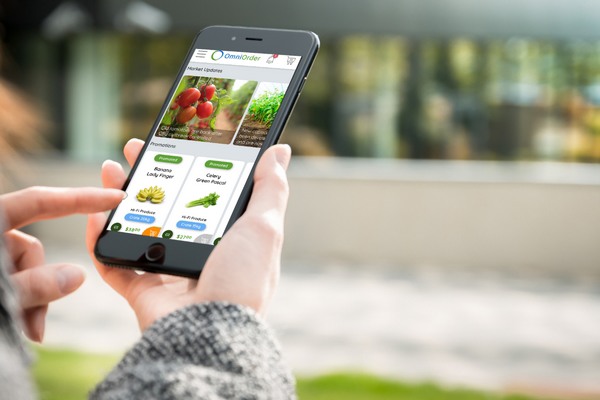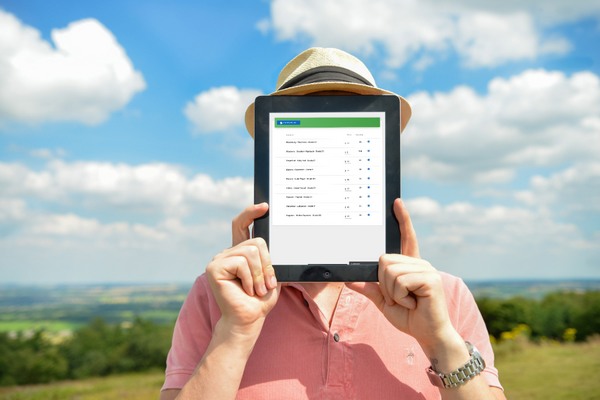Australian Agtech company, Optomni has today announced the upcoming launch of a new innovative digital marketplace for fresh produce, allowing buyers and sellers to trade in real-time, using an internet-enabled device.
OmniOrder™ is an ordering and sales solution for every step of the supply chain, from growers, wholesalers, retailers, and food producers to cafes and restaurants. CEO Murad Mekhtiev says there are both short and long-term benefits for the platform.
"We will see a network effect emerge as more buyers and sellers use the platform," he said. "Buyers and sellers immediately benefit by saving time and reducing manual data entry for their orders. They also reduce the risk of losing data by having communications centralised in one platform. Buyers benefit from more transparency in the supply chain. Once the platform gets traction, sellers can access a wider pool of buyers, not just the ones that they have been dealing with for a long time."

After the early access period, Optomni will support international trade and will support marketing to bring on board overseas buyers and develop that market.
Mr Mekhtiev says OmniOrder is not just a platform based on listings, which are often hard to manage because they require constant data entry and management, but it has embedded tools to better manage and control inventory.
"Sellers get alerts when stock is being sold slower than usual, which allows them to take corrective action rather than discount stock to move it, or risk spoilage or downgrade," he said. "For larger enterprise customers, we can integrate with their ERP systems, further reducing manual processes. Sellers and buyers can now register for our early access program, which will allow us to agree on tailored engagement and pricing which we will honour into the future. The early access program is meant for the early adopters who share our vision for greater trading transparency and want to make it a reality. It's also a chance to help shape a platform for the whole industry and receive a preferential commercial position in that platform. We are looking for long term partners here that believe that the future is based on a digital trading platform. Buyers and sellers can invite others to join the platform, and the more people on it, the better for everyone."

Food waste in the fresh produce supply chain occurs for many reasons, according to Mr Mekhtiev, one of which is poor demand forecasting. He says digital trading allows all parts of the supply chain to use AI algorithms that can monitor demand and sell-through rates and alert sellers when a particular batch is selling too slowly and is at risk of spoilage or quality downgrade.
"The industry has done a lot to reduce outright waste by donating stock that isn't sold, but there is still a lot of waste," Mr Mekhtiev said. "On the buying side, waste happens due to overbuying, again a problem that is due to poor matching between supply and demand. The guys on the ground do a good job of this manually, but it's something that is more suited to computers, which will give them more time to focus on building and strengthening relationships. The big supermarkets have invested millions into software that does this, but independents are still trying to figure it out on paper. That puts them at a disadvantage. Finally, one of the reasons that waste happens on the farm is because the supply chain is not that transparent, and it's hard to open up new markets when needed. We saw this recently in the onion industry where there was an oversupply, and growers simply didn't have the access to global markets to find new buyers."

The application helps automate repetitive processes, maintain supplier/customer communication and loyalty through private and select pricing. The Optomni CEO says that one of the advantages of going digital, especially in the fruit and vegetable industry, is there is not yet a great appreciation and understanding for the role that technology can play - but the opportunity is huge.
"It's no secret that the industry in Australia is traditional," he said. "I haven't seen those carbon copy paper ordering books in a long time in other industries, but I've seen a lot in this one. We see a lot of innovation happening from companies around the world, including Amazon Fresh which puts the industry in a vulnerable position to external disruption. To some extent, the big supermarket chains have already been disrupting the independent sector and we want to give the sector the tools to compete. For example, the big chains have invested millions into AI-powered software that can run auto-replenishment, while independent retailers typically still walk around the store with clipboards and placing orders manually. There have been a lot of technological advances in recent years, but not a whole lot of adoption in this space. As someone coming from outside of the industry, I don't think that the industry appreciates the full extent of both the threat and the opportunity in technology - it's only a threat if you don't adopt it, if you do, it becomes an opportunity for competitive advantage."
 Mr Mekhtiev says the platform was backed up by intensive on the ground research in fresh produce markets in Queensland, Victoria, and South Australia.
Mr Mekhtiev says the platform was backed up by intensive on the ground research in fresh produce markets in Queensland, Victoria, and South Australia.
"We visited growers, wholesalers, and independent retailers, as well as surveyed a good cross-section of them to understand desired features and unlocked benefits," he said. "We wanted to understand internal business processes, as well as what the opportunities are for unlocking more value. We saw opportunities for unlocking value through reducing manual processes, as well as opportunities opened up through greater transparency in the supply chain. Every conversation that we have with a grower, wholesaler or retailer allows us to feed new ideas into our platform."
For more information
Murad Mekhtiev
Optomni
Phone: +61 406 022 744
murad@optomni.com
www.optomni.com
